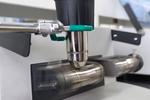Other

“Layered lithium cobalt oxide, a key component of lithium-ion batteries, has been synthesized at temperatures as low as 300°C and durations as short as 30 minutes. Lithium ion batteries (LIB) are the most commonly used type of battery in …

“The first-ever molecular catalyst specifically tailored for mechanochemical reaction conditions enables high-efficiency transformations at near room temperature. Chemists at Hokkaido University and the Institute for Chemical Reaction Design and Discovery (WPI-ICReDD) have developed the first high-performance catalyst specifically designed …

“Researchers have developed a novel technique to investigate the dynamics of the early Solar System by analyzing magnetites in meteorites utilizing the wave nature of electrons. Within meteorites, the magnetic fields associated with the particles that make up the object …

“Hokkaido University researchers have developed a simple method that converts existing generic polymers into luminescent polymers using mechanical force. Researchers from Hokkaido University have successfully developed a new method to give luminescent properties to generic polymers, such as polystyrene and …

“A strategy inspired by the process responsible for muscle growth could lead to the development of stronger, longer-lasting materials. Hokkaido University researchers have developed a strategy to fabricate materials that become stronger in response to mechanical stress – mimicking skeletal muscle …

“Researchers more than doubled the ability of a material to convert heat into electricity, which could help reduce the amount of wasted heat, and thus wasted fossil fuel, in daily activities and industries. Researchers from Hokkaido University and their colleagues …

“Scientists at Hokkaido University and Kyoto University have developed a theoretical approach to quantum computing that is 10 billion times more tolerant to errors than current theoretical models. Their method brings us closer to developing quantum computers that use the …

“A team of researchers from Hokkaido University and Kansai University has developed DNA-assisted molecular robots that autonomously swarm in response to chemical and physical signals, paving the way for developing future nano-machines. The world’s smallest “swarm robot” measures …

